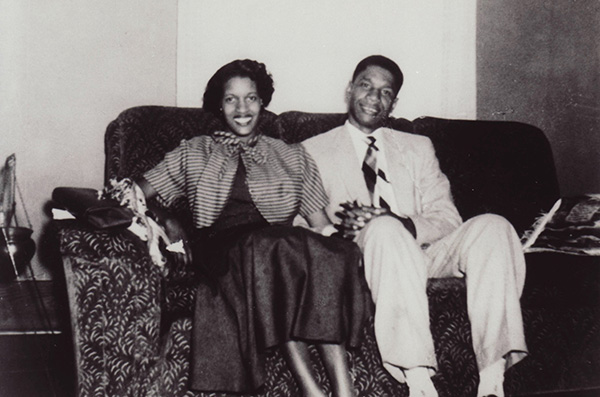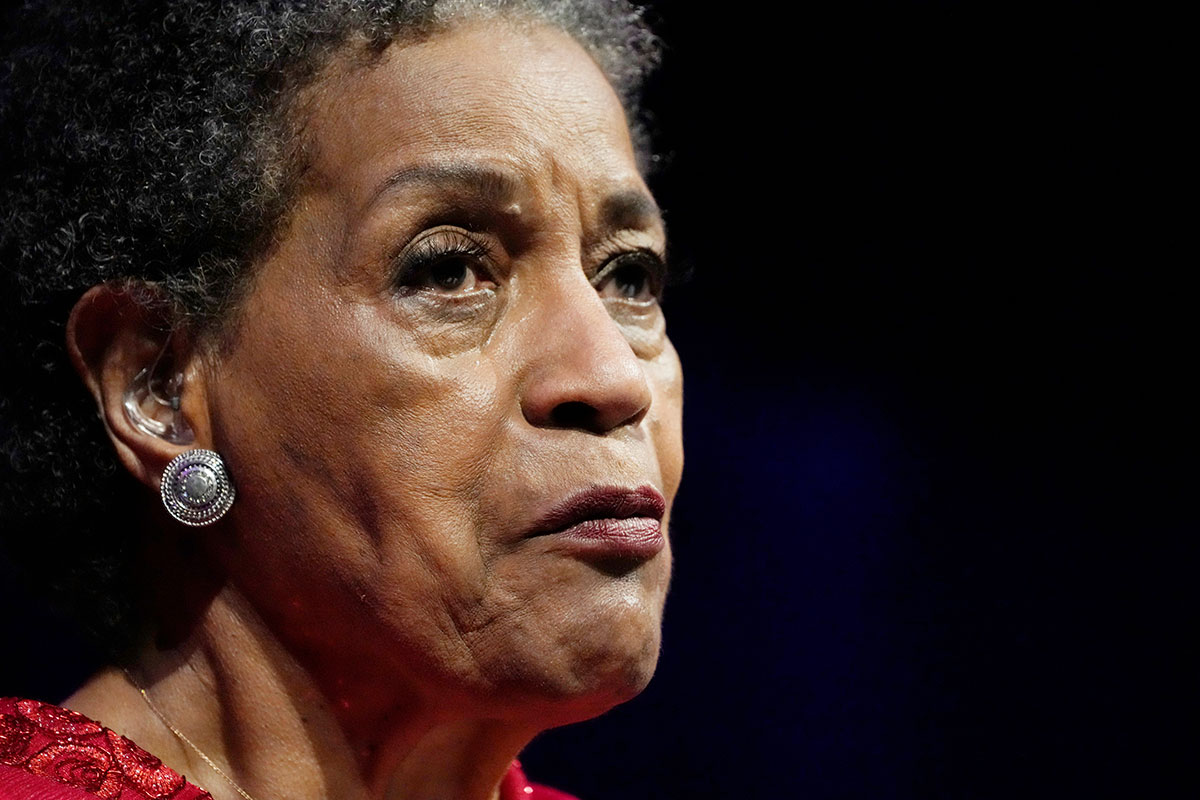JACKSON, Miss.—A yellow Durham school bus pulled up in front of the M. W. Stringer Grand Lodge on Medgar Evers Sunday on June 11, 2023. Visitors stepped off into the sunlight near the National Park Service pop-up tent before quietly meandering inside and upstairs to the offices of the Mississippi NAACP, where they observed the office of former NAACP Field Secretary Medgar Evers.
Ushering the group onto a balcony, the guide explained that they were overlooking the room in which an overflowing crowd of mourners had gathered for Evers funeral just days after he was murdered in Jackson on June 12, 1963. Everyone retreated downstairs, taking several photos in front of the historic structure, before boarding the bus again to head to their next stop, the Evers’ home.
Sixty years later, Myrlie Evers-Williams again stood at that small rancher home examining the spot where her husband was gunned down with her and her children inside. The widow, and national hero in her own right, visited that day during the Medgar and Myrlie Evers Institute’s Voices of Courage and Justice event, which spanned from June 6 to June 12. The week-long tribute recognized the life and work of Medgar Evers on the 60th anniversary of his assassination. It included tours, a parade, a gala and recognition ceremonies that focused not only on Evers, but also on the work of his wife.
“Medgar is so very much a part of me, and he’s here,” Evers-Williams, who later remarried, said from the home.
‘Human Beings Have Yet to Reach Our Potential’
Medgar Wiley Evers became the first field secretary of the Mississippi NAACP in 1954, the same year that the U.S. Supreme Court’s Brown v. Topeka Board of Education school-desegregation decision caused a surge of white-supremacist resistance and violence in Mississippi and other states. Evers-Williams—who was born Myrlie Louise Beasley in Vicksburg, Miss., in 1933—became his secretary and worked alongside him as he organized voter-registration drives and boycotts, as well as civil-rights demonstrations in support of racial equality.
For more than a decade despite continual threats of violence, the couple worked to end segregation in schools and public facilities and campaigned for voting rights for Black residents. Byron de la Beckwith, a member of the Ku Klux Klan and the racist Citizens Council, killed Evers by shooting him in the back while he was exiting his car on June 12, 1963, just hours after then-President John F. Kennedy gave a televised speech advocating civil-rights legislation.
“When my husband was shot at the doorstep of our home, June 12, 1963, I thought my life was over,” Evers-Williams told the crowd gathered for the ceremonial opening of the Medgar and Myrlie Evers Home National Monument. “And I realized it was just beginning because there were three children—Medgar’s children, my children—who were looking up to me.”

Evers-Williams, who is now 90 years old, then became an activist in her own right. After her husband’s death, she and her three young children relocated to Claremont, Calif., but she continued civil-rights activism. She remained active in the NAACP and was elected chairwoman of the national organization in 1995. In 1998, she was awarded the organization’s Spingarn Medal as a “Civil rights activist, risk-taker, mother, true believer.”
Evers-Williams was the first Black woman to serve as a commissioner on the Los Angeles Board of Public Works, and she received numerous honors and awards for her work in the corporate world.
In 1989, Evers-Williams founded the Medgar Evers Institute to preserve and advance the legacy of Medgar Evers’ work. On the 50th anniversary of the assassination of Medgar Evers, the organization changed the name to the Medgar and Myrlie Evers Institute to honor the legacy the Evers-Williams created all her own. She currently serves as chairman emeritus of the Institute, which focuses on the continued pursuit for civil rights through a focus on education, history and reconciliation, specifically among young people.
“I’m strong in the faith of my God, but I’m also strong in the faith that I have in humanity,” Evers-Williams said to the crowd. “I do believe that we as human beings have yet to reach our potential.”
‘No Hate in My Heart for Anyone’
Myrlie’s Garden also opened during the week’s events. The historic location, on the corner of Missouri Street in Jackson, is where Evers-Williams once hosted a local garden club for her African American neighbors who were not allowed to join other clubs of that nature.
Today, the community garden features flowers, herbs, and vegetables as well as a sheltered pavilion, educational exhibits, picnic benches, and a paved walkway. It will be a place where those who visit the home can reflect on the life that these two icons have lived.
On Monday, local leaders and community members assembled at the garden to honor the family’s legacy and sacrifice.
“I’m so grateful I can stand here and say I have no hate in my heart for anyone,” Evers-Williams said. “No hate in my heart for anyone but a determination to see that those things that Medgar fought for and gave his life for and others like him fills my heart.”
Editor’s note: Reena Evers-Everette, the daughter of Medgar Evers and Myrlie Evers-Williams, is on the advisory board of the Mississippi Free Press, which did not influence this story. Read her story about her fathers’s murder here: “I Watched My Father Medgar Evers Die, But You Cannot Kill His Ideas.”






